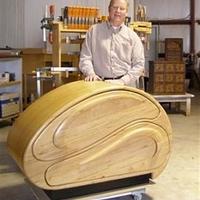
Huff
in almost 12 years
How much money can you really make doing woodworking?
How much money can you really make doing woodworking?
I know that’s a loaded question with no “set in stone” answer, but it is a question that maybe you should be asking yourself if you are trying to make some money selling your woodworking.
How many times have you heard a woodworker say; I love woodworking and I sell some of my work, but I could never make a living doing it. Maybe you’ve said it yourself, or at least felt that way.
Have you ever tried to figure out why? Usually it’s simply a matter of figuring out how much of our time we spend in the shop and how little we actually make when we sell some of our work. Too much time with too little results!
You don’t have to be a rocket scientist to figure out the amount of time you are spending now in the shop compared to how much money you make, there’re simply not enough hours in the day to make enough to make a living as a woodworker.
If you’re retired, have an income and doing woodworking as a hobby, then you are probably not as concerned with the actual amount of time spent building something compared to what you may sell it for.
If you have a full time job and doing woodworking as a hobby, yet still want to sell and make some money doing woodworking, then you begin to realize that you are giving up most of your evenings, days off and week-ends (allowing very little time for the family) to make a few projects and make a few bucks.
At this point, you begin to feel it would be impossible to replace your full time job with a woodworking career and make a living……………….and that’s so true.
This is where so many woodworkers fail to see the difference between being a hobbyist, a part time woodworker and a full time professional woodworker.
So let’s ask this question again; how much can you make doing woodworking? That will be determined by you and how much time you want to devote to woodworking. Do you want to treat it as a hobby, a part time business and part time income, or do you want to be a professional business and make a full time income from your woodworking.
Is making a couple thousand dollars a year sufficient to support your hobby and buy a new tool now in then, or would you like to supplement your full time employment by making an extra $10,000 to $20,000 a year.
How many woodworkers out there think you (totally by yourself, a one-man shop) can design, sell, build, finish and deliver say $100,000 dollars a year, and if so, would that be enough to call a living.
I would never ask anyone how much they get paid, and I’m not asking you, but for you to ask yourself. The next question you may want to ask yourself is; how much time am I willing to put into my woodworking to make that extra $2,000 a year as a hobby, or $10,000 to $20,000 a year as a supplemental income or $100,000 (or whatever figure it would take to make it a worthwhile full time career)?
You need to know where you fit into the equation, or maybe more importantly, where you want to fit into the equation. So you may need to ask yourself one more question; how much time do I spend at woodworking now and what kind of return am I getting on my investment of time.
However many hours that may be now and how much you may be making, if you ramped that up to 40 hours a week, 50 weeks a year, would that make a decent income for you? If not, then either you can’t build enough in a year’s time, or you’re not pricing your work correctly.
And of course to throw a monkey wrench into the mix of things; even if you can build enough in a year’s time, do you know how to market and sell that much inventory in a year?
I’d love to hear some of your comments.
Not about it depends on the economy (that’s just an excuse, because a successful business will survive during both good and bad times).
Don’t want to hear about location; if you’re not in a good location, find the market that works for you and your woodworking! It’s done everyday all over the world.
Don’t want to hear about nobody will pay for quality anymore. Obviously you’re looking in the wrong places and talking to the wrong people. Every level of quality products is sold everyday in this world. (Not everyone shops at Wal-Mart, so quit trying to sell to that market.)
Don’t want to hear about competition or the hobbyist undercutting your price. If you’re truly building a quality product and marketing it to the right clientele, then you should not have to worry about getting a fair price for your work and worrying about a hobbyist or competition undercutting your price.
_ Price will always be the number one determining factor if you are simply trying to sell to the masses. _
When you find the right market and clientele to sell your work to, then pricing becomes just a part of the determining factor whether a customer chooses to buy from you or not.
I’ll be talking about marketing and selling more as we go along.
I hope I’ve given you some food for thought and you take the time to look at your current situation and decide if that’s where you want to be with selling your woodworking.
Thanks for following along.
John (huff)
www.thehuffordfurnituregroup.com
John @The Hufford Furniture Group
10 Comments
I don’t expect to “make a living” from my woodwork, but I will be selling some of it. Saying that will definitely eliminate my input to this blog but I do, most emphatically, want to follow along with it.
I am so impressed that there are people out there that can make a living from this, so impressed with the effort it takes to be salesman, accountant and craftsman. In awe really. I’m not sure I’d have the balls for it. Best of luck.
-- Alec (Friends call me Wolf, no idea why)
Wolf & Rabbit,
I’m glad you’re following along. I would like to take all woodworkers into consideration when writing and getting responses.
I realize every woodworker is at a different level not only with skills, experience, tools, but also how much money (if any) they would like to make doing woodworking.
I would love input from everyone. Sure I’ve made my living being a professional woodworker and would like to offer support to those that would like to make it a full time career, but not everyone wants woodworking as a career but that doesn’t mean they wouldn’t like to make some money at it anyway.
I would like to help those that would like to sell some of their work and actually feel good about what they charge and make enough to make an actual profit.
I hope you will continue to follow along and will feel comfortable to give us some of your thoughts and what some of the things that may bother you when it comes to pricing and selling your work.
Like I said in my first segment; I was a very shy and bashful guy when I started and that made it very difficult for me to talk to people I didn’t know. It took me a long time and a lot of effort to get over those short comings, but now I enjoy the selling part of business as much as the woodworking.
John @The Hufford Furniture Group
Woodworking is a hobby for me. I strongly believe once you want to make money out of anything it is no longer a hobby; it becomes a business. With that a lot of responsibility come your way.
I agree with much of what you wrote but I would like to point out that you can still scale your daily production and make several articles you could sell as long as they are the same.
Abbas, Castro Valley, CA
How good you are and how many customers you have will decide of your income.
Some makes OK incomes and some have very good income.
Some just survive.
Like any business, you generally get out what you put in and the location of your business is also very important.
I believe that you questions does not really have an answer, to many variables.
An other important factor, may be the most important, is : how good business man are you?
You might be the best craftsmen but a lousy business man, if so you will starve to death.
I know by experience that I ma not a businessman, this why I will never start my own business to live off it.
I believe that those who make a good living of wood working are the exception. Where I live the competition is crazy and it is very difficult to make a decent living, yet I know two persons who makes an OK living of cabinet making.
Another consideration is that when you own your business, you work 24 hours day ,7 days a week .Are you willing to that?
Frenchy
lanwater,
I couldn’t agree with you more that once you want to make money (really with any hobby) then it becomes a business.
There’s that fine line between being a hobby and being a business and for a lot of woodworkers that line can get pretty fuzzy.
It’s a whole lot easier calling it a hobby (even if you’re selling your work for money) for a number of reasons.
1. Hobby is suppose to be fun………..Business is hard work!
2. Hobby doesn’t matter if you make a profit, or at least anything you sell it for over cost of materials you can call a profit.
3. In business, if you don’t make a profit you fail.
4. Hard to fail as a hobby.
5. 6 out of 10 businesses fail and most don’t like to risk failure.
6. Like Frenchy just stated in his post; most woodworkers are not businessmen.
7. As a self employed businessman, you do have to be willing to put endless hours in your business if you would like to be successful.
8. As a hobby, you work at it only when you want to and most everything else in life carries a higher priority.
As a professional woodworker, there where many times I was jealous of the hobbyist for all the above reasons and also over the years I’ve had a lot of hobbyist tell me they wish they could do what I did for a living. (I guess the grass is alway greener on the other side of the fence) lol.
It’s all good as long as we’re doing what we love.
Getting back to talking about making money though, I really wanted the average woodworker that is trying to make some money selling their work to take the time and give some thought about what they would like (or expect) to achieve from selling their work.
You can make money doing woodworking whether you’re a hobbyist, a part-time woodworker or a full time professional. The important thing is, it will depend on how you price your work and how you market yourself and your product.(assuming you know how to built a quality product).
Frenchy,
Thanks for the post and you brought up some really good points.
The reason most woodworkers fail as a business is exactly what you stated; most are not business people. Knowing how to do woodworking is just a small segment of running a successful and profitable woodworking business.
I’ll try to talk about that more in my upcoming series.
John @The Hufford Furniture Group
I started woodworking back around 72.. The tools I had barely qualified as such. However, people liked the simple things I did and my hobby bought me more and better tools. In time, my hobby bought me a shop and vehicles some small shops would envy. I was able to do more, do it faster, and still put out reasonable quality (I look at some of the work you other guys and gals do and I stay with calling my work reasonable).
I was just having fun, which, I believe, is key to success, whether you go pro or stay hobbyist.
As time moved on, I realized diversity of products would play a big role in my success. As such, my woodwork expanded until it included rough woodwork, or simple carpentry (but only to the degree necessary, as a filler).
I incorporated glass etch, granite and other things into my woodworking projects. I tried to focus on doing what others, cabinet makers, didn’t bother with. One day I might make a plant stand, another I might make a unique picture frame or shadow box, and on another a clock, burl coffee table or display pedestal.
I learned about finishes and probably knew more about making exterior wood, including cedar shakes and shingles, hold up to the elements than more than ninety percent of the contractors out there. I shared those secrets openly, so the people could do it themselves next time, knowing only a handful would, and that got me a lot of jobs.
When the “what others aren’t focusing on” projects were slow, I’d install molding and trim, build a deck or stairs, maintain a deck or fence and so on.
I cut consignment deals with little stores that couldn’t afford to buy inventory. Even stores that didn’t deal with my product were interested, if they didn’t have to put money out up front.
I ignored a [seasoned] friend, who kept pushing me to advertise. When I finally did listen, placed ads, and after they kicked in, I received calls on them five years after they went live. Long enough to build a clientele.
Sometimes I made $150.00 or more an hour. However, I might have only had an hour or two of work that day. Generally though, once I had enough tools to do whatever I was called upon to do, I began living better than I ever did working for someone else. Of course, I also came to understand that saying “[w]hy work for someone else eight hours a day when you can work for yourself eighteen?”
So, yes, you can survive as a woodworker. It just depends on how you go about it.
Regardless of what you do, there will be something to learn about it right up until you quit doing it. Some things are good to learn early on, such as, if you are getting all your bids, you’re too low.
I only started what I’d consider real woodworking a couple years ago. I haven’t had any formal training, and don’t have any living family members that did woodworking for a living to help guide me. The last “cabinet maker” in my family died in the 1930’s (my great grandfather). As such, learning has been very slow going, and has been mostly through making mistakes. Many, many mistakes. Though, the people I work with seem to like what I do enough to pay me for building certain things here and there. A friends son hired me to build his kitchen cabinets back in October, so I started a business to get better deals on supplies and such, and I still work my day job (boring). I’d love to make a living doing this, but in order to do so, I need ALOT more experience, and need to be quicker. I’m about to install the kitchen this weekend finally. Yes, I started in October…it is now almost May….Granted, I had to wait three months for a payment, so its not all me, but I’m just not fast enough. Trying to do this as a side business, and be a father to three sons and husband to a very understanding and patient wife is next to impossible. I’m thankful for the opportunity, as it has really made me think twice about making a go of this as a full time career. How much money can I make doing woodworking?…lets just say I’m not going to quit my day job.
Kelly,
Thanks for your input, it was very well put. I thought you were talking about my career in woodworking for awhile. We’ve run along the same lines on a lot of things. I found that if you wanted to survive in this business, you needed to;
1. Market yourself, your business and your product.
2. You needed to find a niche, or another words, be willing to do what a lot of the others didn’t or wouldn’t do.
3. Be willing to change as times and conditions changed. Be able to adjust, adapt and make things work whatever it took.
4. And yes, most importantly…………….enjoy what you are doing. I still have the same passion towards my woodworking as I did when I first started.
5. It’s a never ending learning experience. I don’t care how big or how small a project is, I try to learn something new each and everytime.
6.. I might have been able to make more money working for someone else, but I know I would never had enjoyed life as I have as a professional woodworker.
Thanks again for your input.
John (huff)
John @The Hufford Furniture Group
David,
When I started my business 30 years ago, I had no formal training either. No tools and very, very limited budget to get started with.
That’s definitely not the way to start a business, but my passion for woodworking blinded any common sense about the proper or smart way to start a woodworking business.
I had to laugh when I read you are doing a kitchen because that was the very first commissioned job I got when I went into business. It was a great learning experience and she is still one of my best customer references. Over the past 30 years, it’s hard to say how many customers she has referred to me.
I’m not sure if you’re familiar with Lumberjocks, but I have written a couple blog series.
One on; “how to price your woodworking and make a profit” and another; “How to market and sell your woodworking”
There may be some ideas that will help you as you progress with your business.
http://lumberjocks.com/huff/blog/series/6413
http://lumberjocks.com/huff/blog/series/6466
Good luck and feel free to ask any questions if there is anything I can help you with.
John (huff)
John @The Hufford Furniture Group
Right now I have plans to get a farm in 6-7 years and need about $60,000 I can currently save $200 a month after living exspences and need to earn about $600 a month to reach my goal. My woodworking goal is $700 a month for now and after I get my farm I would loke to make $500-$1,000 a month with my woodworking.
Jamie Hord












